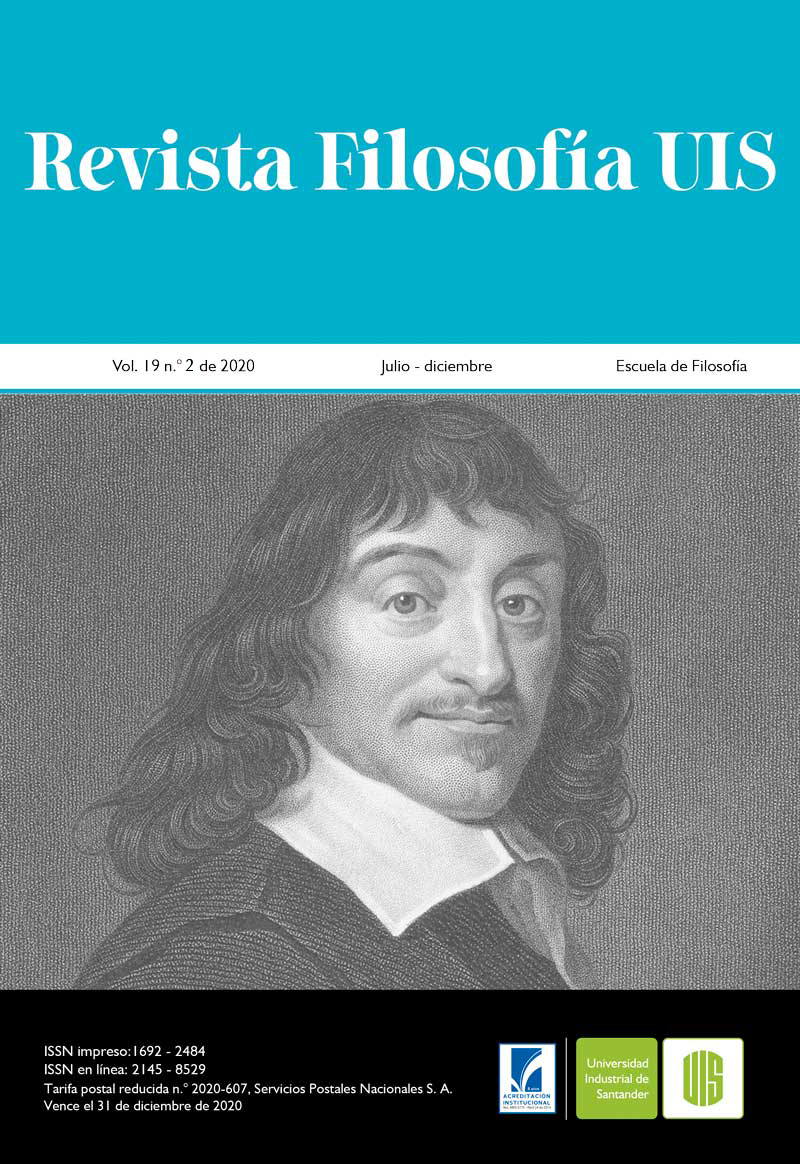Publicado 29-05-2020
Palabras clave
- sentido interno,
- apercepción,
- autoconciencia,
- yo,
- psicología
Cómo citar
Derechos de autor 2020 Revista Filosofía UIS

Esta obra está bajo una licencia internacional Creative Commons Atribución 4.0.
Resumen
En este artículo se debate el uso de ciertos términos asociados a la teoría de la experiencia interna de Kant. La experiencia interna es un tema relevante en el pensamiento de Kant, el cual comprende problemas metafísicos y antropológicos dignos de consideración. Al examinar la Crítica de la Razón Pura y la Antropología en sentido pragmático se puede evidenciar el uso confuso de los términos: sentido interno, apercepción empírica, pura y trascendental, autoconciencia discursiva e intuitiva, conciencia de sí mismo dividida en reflexión y aprehensión y conciencia intelectual y empírica de la existencia de uno mismo. Por consiguiente, me centro en el significado filosófico de los anteriores términos y de su relación con el problema de la experiencia interna, la cual depende de la experiencia externa. Finalmente, abordo el problema del contenido del sentido interno, sugiriendo que su contenido no corresponde al de una cosa simple sino al de un flujo de representaciones internas.
Descargas
Citas
Aquila, R. E. (1983). Representational Mind: A Study of Kant’s Theory of Knowledge. Indiana University Press.
Brook, A. (1994). Kant and the mind. Cambridge University Press.
Carl, W. (1992). Die Transzendentale Deduktion der Kategorien in der ersten Auflage der Kritik der reinen Vernunft. Vittorio Klosterman.
Carruthers, P. (2011). The Opacity of Mind: An Integrative Theory of Self-Knowledge. Oxford University Press.
Cohen, A. A. (2009). Kant and the Human Sciences: Biology, Anthropology and History. Palgrave Macmillan.
Collins, A. W. (1999). Possible Experience: Understanding Kant's Critique of Pure Reason. University of California Press.
Dessoir, M. (1924). Kant und die Psychologie. Kant-Studien, 29, 98-120.
Dyck, C. W. (2016). The Scope of Inner Sense: The Development of Kant’s Psychology in The Silent Decade. Con-Textos Kantianos: International Journal of Philosophy, (3), 326-344.
Foucault, M. (2008). Introduction to Kant’s Anthropology. (R. Nigro & K. Briggs, trans.). Semiotext.
Howell, R. (2001). Kant, the ‘I Think’, and Self-Awareness. In P. Cicovacki (Ed.), Kant's Legacy: Essays in Honor of Lewis White Beck (pp.117-152). University Rochester Press.
Hume, D. (1739/21978). A Treatise of Human Nature. Selby-Bigge & P. H. Nidditch (Eds.). Oxford University Press.
Kant, I. (1900ff.). Kant‘s gesammelte Schriften, Akademie Ausgabe. In Königlich Preussischen Akademie der Wissenschaften (Ed.). G. Reimer [later W. de Gruyter].
Kant, I. ([1781/1787] 1998). Critique of pure reason. In P. Guyer., & A. W. Wood (Eds.). Cambridge University Press.
Kemp Smith. N. (2003). A commentary to Kant’s “Critique of Pure Reason” (3rd ed.). Palgrave Macmillan.
Kirchmann, J. H. (1869). Erläuterungen zu Kant's Anthropologie in pragmatischer Hinsicht. Verlag von L. Heimann.
Kitcher, P. (2016). What Can Humans Cognize about the Self from Experience? Comments on Corey Dyck’s “The Development of Kant’s Psychology during the 1770’s”. Con-Textos Kantianos: International Journal of Philosophy, 1(3), 345-352.
Longuenesse, B. (2006). Self-consciousness and consciousness of one’s own body: Variations on a Kantian theme. Philosophical Topics, 34(8), 1–2, 283-309.
Lycan W. (1996). Consciousnes and experience. MIT Press.
Makkreel, R. (2014). Self-Cognition and Self-Assessment in Kant’s Lectures on Anthropology. In A. Cohen (Ed.) Kant’s Lectures on Anthropology (pp. 18-37). Cambridge University Press.
Marshall, C. (2010). Kant’s Metaphysics of the Self. Philosophers’ Imprint, 10(8), 1-21.
Melnick, A. (2009). Kant’s theory of the self. Routledge.
Mohr, G. (1991). Das sinnliche Ich: Innerer Sinn und Bewußtsein bei Kant (Vol. 81). Königshausen & Neumann.
Monzel, A. (1920). Kants Lehre vom inneren Sinn und der Zeitbegriff im Duisburg'schen Nachlaß. Kant-Studien, 25 (1), 427-435.
Pacheco Acosta, H. (2018). Theoretical assumptions in Kant’s theory of time. Sincronía, (74), 29-58.
Pappe, H. O. (1961). On Philosophical Anthropology. Australasian Journal of Philosophy, 39 (1), 47-64.
Paton, H. J. (1936). Kant's Metaphysic of Experience: A Commentary on the first half of the Kritik der reinen Vernunft (Vol 1). Allen & Unwin.
Picciuto, V. & Carruthers, P. (2014). Inner sense. In D. Stokes, M. Matthen, S. Biggs (Eds.), Perception and Its Modalities (pp. 277-296). Oxford University Press.
Prauss, G. (1971). Erscheinung bey Kant: ein Problem der “Kritik der reinen Venunft”. De Gruyter.
Roche, M. (2013). A Difficulty for Testing the Inner Sense Theory of Introspection. Philosophy of Science, 80(5), 1019-1030.
Rockmore, T. (2012). Kant on Unconscious Mental Activity. In P. Giordanetti, R. Pozzo & M. Sgarbi (Eds.) Kant’s Philosophy of the Unconscious (pp. 305-326). De Gruyter.
Rukgaber, M. S. (2009). The Key to Transcendental Philosophy: Space, Time and the Body. Kant-Studien, 100(2), 166-186.
Schmitz, F. (2013). On Kant’s Conception of Inner Sense: Self-Affection by the Understanding. European Journal of Philosophy, 23(4), 1044-1063.
Shoemaker, S. (1994). Self-Knowledge and "Inner Sense" Lecture I: The Object Perception Model. Philosophy and Phenomenological Research, 54(2).
Schulting, D. (2015). Transcendental Apperception and Consciousness in Kant’s Lectures on Metaphysics. In R. R. Clewis (Ed.), Reading Kant’s Lectures (pp. 89-114). De Gruyter.
Strawson, P. (1966). The Bounds of Sense: An Essay on Kant’s Critique of Pure Reason. Methuen & Co. Ltd.
Strawson, P. (1997). Entity and Identity: And Other Essays. Oxford University Press.
Sturm, T. (2017). Reines und empirisches Selbstbewusstsein in Kants Anthropologie: Das “Ich” und die rationale Charakterentwicklung. In G. Motta & U. Thiel (Ed.), Immanuel Kant: Die Einheit des Bewusstseins (pp. 195-220). De Gruyter.
Thiel, U. (1997). Varieties of inner sense. Two pre-Kantian theories. Archiv für Geschichte der Philosophie, 79(1), 58-79.
Valaris, M. (2008). Inner sense, self-affection, and temporal consciousness in Kant's critique of pure reason. Philosophers’ Imprint, 8(4), 1-18.
Vogel, J. (1993). The Problem of Self-Knowledge in Kant's "Refutation of Idealism": Two Recent Views. Philosophy and Phenomenological Research, 53 (4), 875-887.
Wolff, R. P. (1963). Kant's Theory of Mental Activity. Harvard University Press.
Yalcin, S. (2002). The Problem of Inner Sense in Kant's First Critique. Journal of Academic Studies, 4(15), 181-190.

